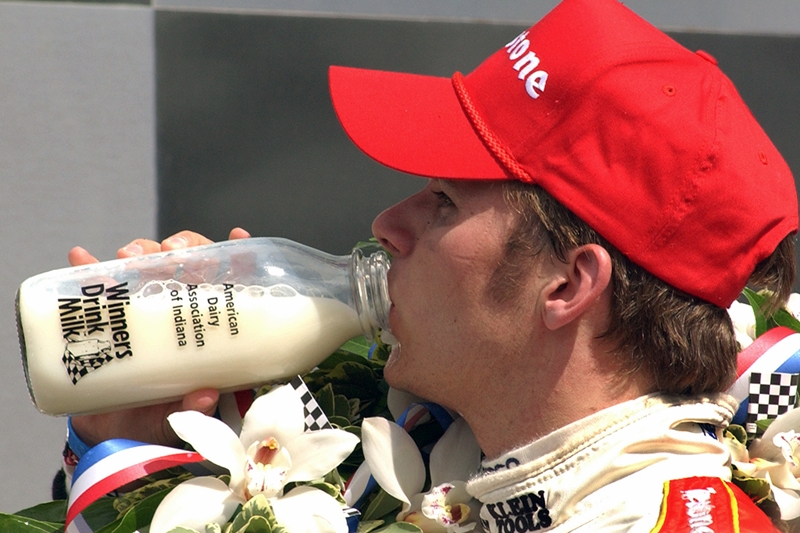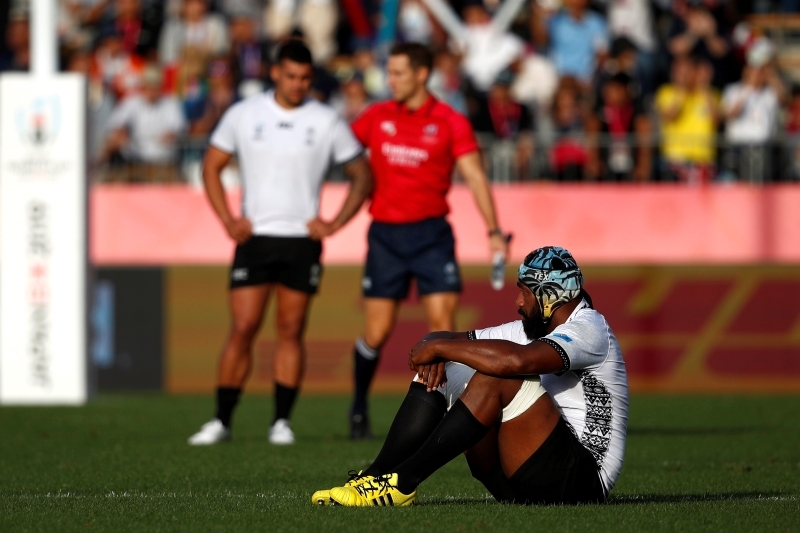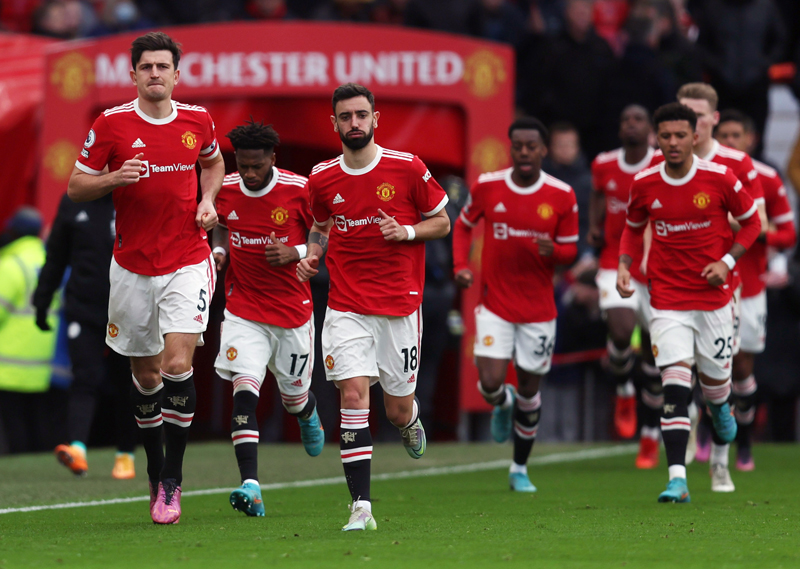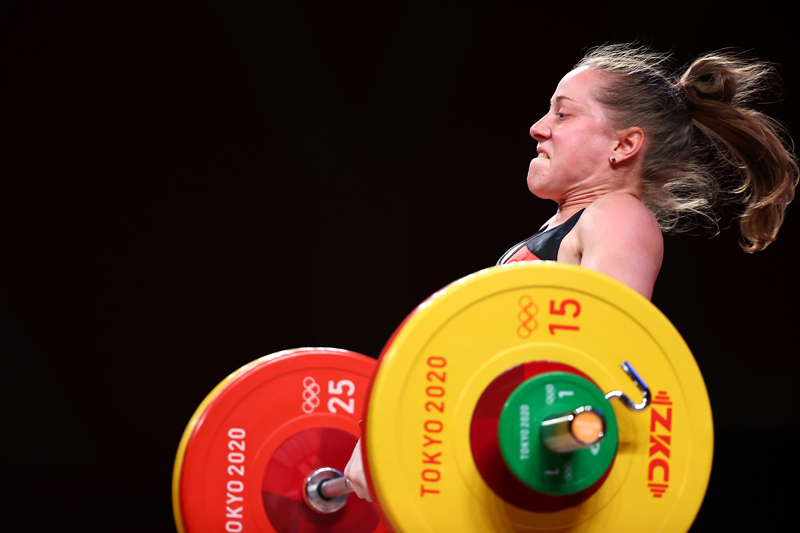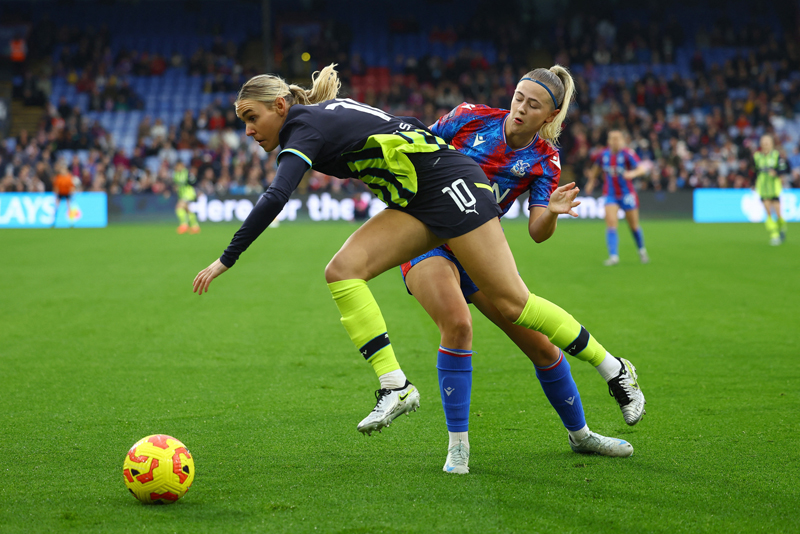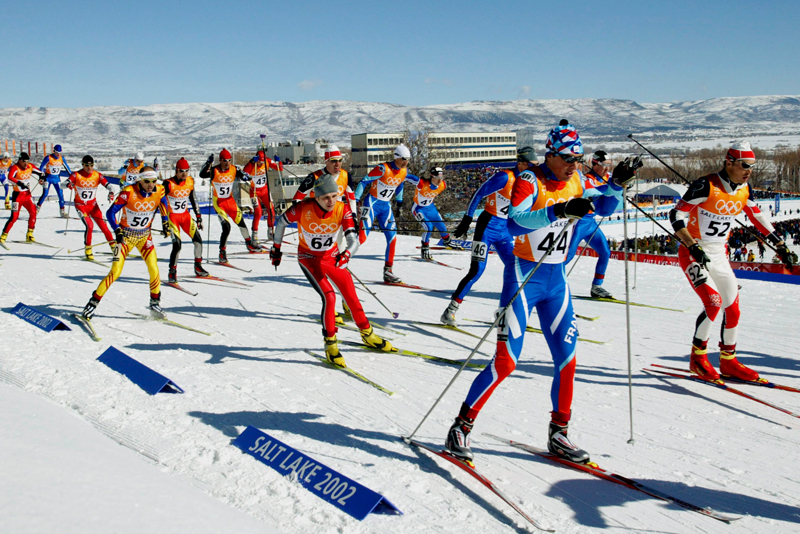You are viewing 1 of your 1 free articles. For unlimited access take a risk-free trial
Protein and recovery: why protein matters for performance!
Consuming protein after hard training is known to boost muscle recovery and muscle tissue growth. But does that translate into better performance during subsequent training or racing? Andrew Hamilton looks at new research and comes up with the answer...
Andrew Hamilton looks at new research on the importance of post-exercise protein for maximising recovery and performance in endurance athletes
It’s almost impossible to understate the importance of rapid recovery after training. The faster and more fully you recover, the sooner you’ll be ready to train again, the better you’ll perform when you do train and the more benefits you’ll get from your training efforts. One key ingredient of post-exercise recovery is rest; the other of course is nutrition. It’s probably not exaggerating to say that if you’re training regularly, the next single most important thing you can do to boost performance is to improve your recovery nutrition!
Four pillars of recovery
In broad-brush terms, there are four major nutritional requirements for rapid recovery after long and/or strenuous exercise. These are as follows:
- *Carbohydrate – needed to synthesise and replenish muscle glycogen (the body’s premium grade fuel for strenuous exercise), and also to top up liver glycogen stores, which serve as a reserve to maintain correct blood sugar levels. Post-exercise carbohydrate also stimulates the release of a hormone called insulin, which helps to drive glucose (from carbohydrate) and amino acids (from protein) into hungry muscle cells, accelerating recovery;
- *Protein – needed to supply the amino acid building blocks required to repair and regenerate muscle fibres damaged during exercise, and to promote muscle hypertrophy (growth) and adaptation;
- *Water – to replace fluid lost as sweat and to aid the process of glycogen storage in muscle (each gram of glycogen synthesised in muscle requires around three grams of water to ‘fix’ it in place;
- *Electrolytes – to replenish minerals lost in sweat (eg sodium, chloride, calcium, magnesium).
Of these nutrients, carbohydrate is by far the most researched. Over the past 30 years, much has been written about the benefits of consuming carbohydrate following exercise. As a result, we now know that the highest muscle glycogen synthesis rates occur when relatively large amounts of carbohydrate (1 0–1.5 grams per kilo of bodyweight per hour) are consumed immediately after exercise, and then at 30–60 minute intervals thereafter, for up to five hours (depending on the duration of the prior exercise)(1).
To date however, our understanding of protein nutrition in the role of recovery has been far more limited - primarily because it is a much more difficult nutrient to study in the lab. Whereas muscle glycogen replenishment is relative easy to measure using muscle biopsy, protein incorporation into muscle tissue requires the use of radio-labelled amino acids (protein fragments) in protein drinks/snacks, which becomes a very expensive and time consuming exercise.
The effect of protein after exercise
What has been established is that adding protein to carbohydrate in a post-exercise drink or snack does appear to enhance muscle tissue synthesis in the recovery period, which simple logic dictates will confer significant potential benefits (see panel 1). In a US study on this topic, researchers from the University of Connecticut compared the effects of a pure carbohydrate drink to a chocolate milk drink (providing a carbohydrate/protein blend containing the same number of calories) on muscle protein synthesis in runners in the 3-hour period following a 45-minute run(2). They observed that chocolate milk drink increased muscle protein synthesis by 38% in comparison to the carbohydrate-only (see figure 1) – ie was significantly more effective in promoting recovery.
Panel 1: Why is maximising post-exercise muscle tissue synthesis important?
Muscle tissue resynthesis following exercise is critically important. During endurance exercise, muscle tissue is broken down – the longer and harder the exercise, the more protein from muscles is lost. It’s important therefore for the body to regenerate this muscle tissue as rapidly and as fully as possible. If recovery is incomplete, muscles can become weaker and less efficient at generating force. Prolonged periods of training where recovery is incomplete or sub optimum will also harm power-to-weight ratio. In the longer term, the risk of injury (through loss of structural integrity) may be increased.
Figure 1: Carbohydrate-only versus carbohydrate and milk protein drink (chocolate milk)(2)
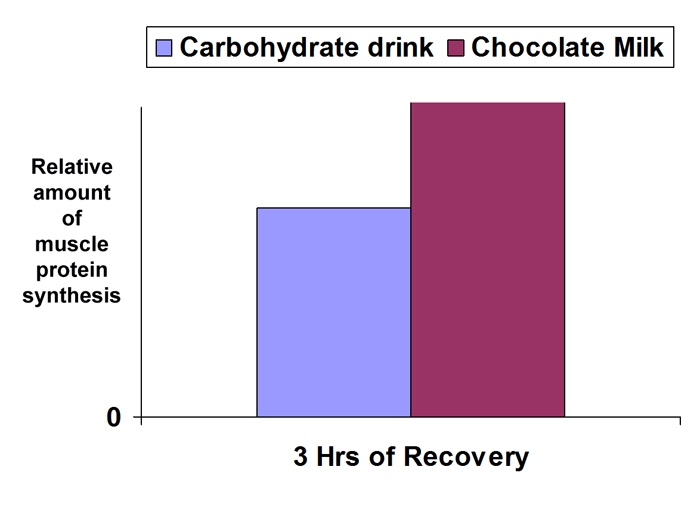
In another study, researchers looked at muscle protein synthesis and different recovery formulations after high-intensity cycling(3). Twelve cyclists completed 100 minutes of high-intensity cycling, then over the next four hours at hourly intervals, ingested one of three recovery drinks:
- 70g protein/180g carbohydrate/30g fat (high protein)
- 23g protein/180g carbohydrate/30g fat (low protein)
- 0g protein/274g carbohydrate/30g fat (zero protein)
The two key findings were that both the protein-containing recovery drinks were superior at promoting muscle tissue synthesis and recovery. However (as figure 2 shows), while the low-protein recovery drink contained only a third of the protein of the high-protein drink, it stimulated muscle tissue synthesis almost equally as well. Importantly however, the protein used in these drinks was rich in leucine. Like all the amino acids in protein, leucine serves as a building block of muscle tissue. In recent years however, scientists have discovered that leucine plays a special role in this process – probably by acting as a ‘signalling molecule’, helping to switch on genes involved in muscle protein synthesis.
Figure 2: Muscle tissue synthesis: zero vs. low vs. high protein recovery drinks(3)

Muscle tissue synthesis was much lower when the cyclists drank the carbohydrate-only drink for recovery. The low-protein drink meanwhile produced almost as much muscle synthesis as the high-protein drink containing triple the protein! NB: Myofibrillar FSR = amount of muscle tissue synthesis measured in % per hour.
Protein, recovery and performance
Increasing the rate of muscle tissue synthesis after exercise by consuming protein is all well and good. But while this approach might help athletes to stay strong as part of a long-term nutritional strategy, are there any real benefits in terms of functional recovery? In other words, does ingesting protein following training or competition speed the recovery of muscles in a way that enhances performance in subsequent bouts of exercise – or does it only help muscle tissue synthesis?
Until recently, the evidence regarding post-exercise protein ingestion and subsequent endurance performance has been conflicting. Despite the proven effects of protein intake on protein synthesis rate, supplementation of proteins (in addition to carbohydrate) is not consistently associated with improved exercise performance. Some studies have reported that intake of protein after exercise improves subsequent performance(5-8), whereas other studies have failed to observe such effects(9-12).
Coming more up to date, a landmark study in 2016 by Norwegian and Danish scientists investigated the effects of supplementing protein + carbohydrate, carbohydrate only or nothing (placebo condition) after exhaustive exercise on a subsequent bout of exercise carried our 18 hours later(13) . To do this, eight endurance-trained subjects cycled at a constant power output averaging 240 watts until complete exhaustion (ie they were no longer able to sustain this power output) on three separate occasions. Then 18 hours later, they repeated the trial a second time at the same power output to see how long they could maintain the same 240-watt power output.
All the trials were identical except what the cyclists were given as recovery drinks during the two hours following the initial trial. These drinks were as follows:
- *Protein + carbohydrate (0.4g of protein per kilo of bodyweight + 0.8g of carbohydrate per kilo of bodyweight)
- *Carbohydrate only (1.2g of carbohydrate per kilo of bodyweight)
- *Placebo (similar tasting drink containing zero protein or carbohydrate)
Importantly, the protein/carb and carb-only drinks were calorie matched, which meant any differences in performance were down to the differences in protein content rather than just energy intake.
The key finding was that in addition to increasing post-exercise muscle tissue synthesis, the protein + carbohydrate drink improved performance in the second trial significantly (by over 27%) compared to the carbohydrate-only drink. When the cyclists consumed the protein/cab drink, their time to exhaustion in the second trial averaged 63.5 minutes. However, when consuming the carb-only drink, they only managed 49.8 minutes. Taking nothing (placebo) resulted in the worst performance, with an average of just 42.8 minutes (see figure 3).
Figure 3: Time to exhaustion in a second bout of exercise
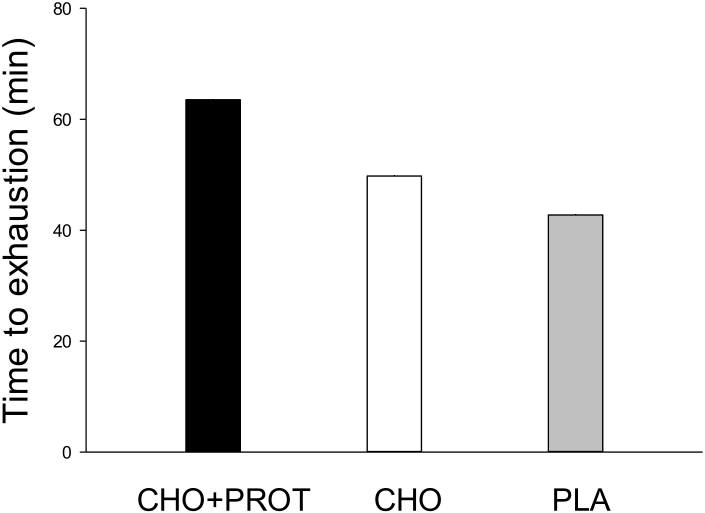
Performance tests after 18 hours of recovery receiving at protein + carbohydrate drink (CHO+PROT), a carbohydrate-only drink (CHO) or a placebo drink with neither protein nor carbohydrate in it (PLA).
However, lest you think that consuming ample carbohydrate wasn’t important for recovery – think again. This is because another important finding was that the intake of a similar amount of protein initially but less dietary carbohydrate during the whole 18 hours of the recovery period also reduced performance. In other words, it appears that both protein and carbohydrate are important for recovery - but that adequate carbohydrate intake needs to be sustained over a longer period to ensure maximum recovery.
The latest research
At the time of writing, further excellent research has just been published, which appears to confirm that adding protein to a post-exercise recovery drink confers real benefits for athletes seeking rapid recovery and the best possible performance in a subsequent bout of exercise (for example in multi-day events)(14). In this study, an international team of researchers investigated the effects of protein and carbohydrate ingestion during early recovery period after exhaustive exercise on subsequent performance after an 18-hour recovery period.
Eight elite cyclists (average maximum aerobic capacity of 74.0mls/kg/min – ie very high levels of fitness!) completed two exercise and diet interventions in a double-blinded, randomised, crossover design (scientifically, the most rigorous kind of study). The cyclists began by cycling at 73% of their maximum oxygen uptake (VO2max) followed by 1-minute intervals at 90% of VO2max until they became exhausted. During the first two hours of recovery following this cycling task, the participants ingested either:
- *Carbohydrate only – ingesting a drink delivering 1.2 g carbohydrate per kilo of bodyweight per hour
- *Protein and carbohydrate – ingesting a drink delivering 0.8 g carbohydrate + 0.4 g protein∙per kilo of bodyweight per hour.
These drink supplied exactly the same number of calories and importantly, the diet during the remaining recovery period was similar for both interventions and adjusted to bodyweight. After an 18-hour recovery, cycling performance was then assessed with a second trial, consisting of a 10 -second sprint test, 30 minutes of cycling at 73% of VO2max and a cycling time trial (TT).
What they found
When the data was analysed, the results were as follows:
The time trial performance in the second trial (after 18 hours of recovery) was 8.5% faster when the cyclists had consumed protein + carbohydrate compared to carbohydrate only (41mins:53secs vs. 45mins:26secs).
The average power output during the day-2 sprints was 3.7% higher (1063 watts vs. 1026 watts) when the cyclists had consumed protein + carbohydrate compared to carbohydrate only.
Nitrogen balance in the recovery period was negative when the cyclists consumed just carbohydrate, with an average protein loss of 82mgs of protein per kilo of bodyweight. However, in the protein + carbohydrate condition, nitrogen balance was neutral – ie the cyclists did not lose any protein/muscle mass. The researchers concluded: “Our results indicate that intake of carbohydrate plus protein after exhaustive endurance exercise more rapidly converts the body from a catabolic to an anabolic state than carbohydrate alone, thus speeding recovery and improving subsequent cycling performance.”
Advice for athletes
Let’s quickly summarise what we’ve discussed in this article and look at the implications for performance:
- *It’s important to understand the importance of the first two hours post exercise for recovery.
- *During this period, you should be consuming fluid, electrolytes (minerals), carbohydrate and protein.
- *All the research suggests that taking protein during this period helps muscles to recover by help the resynthesis of damaged muscle tissue.
- *In terms of performance, some of the earlier research was unable to find an actual performance benefit for taking protein in the recovery period (despite the increase in muscle tissue synthesis).
- *More recent (and high-quality) research suggests that there are real and significant benefits for next-day performance when protein is consumed alongside carbohydrate during the first two hours following extremely hard or exhaustive exercise.
- *This research suggests that around 0.4 grams of protein per kilo of bodyweight (that’s around 30 grams for a 70kg athlete) should be consumed each hour for the first two hours (ie around 60 grams in total spread out over the two-hour period).
- *In terms of protein type, whey is recommended as a) it is digested and absorbed rapidly and b) it is rich in the amino acid leucine, which seems to enhance muscle protein synthesis.
- *Using the 2-to-1 ratio carb-protein employed in these studies, athletes should aim to also consume around 120 grams of carbohydrate following extremely hard/long or exhaustive exercise.
- *We don’t have data on the recovery needs following less strenuous bouts of exercise, but a logical approach would be to still consume a 2-to-1 carbohydrate-to-protein blend but in proportionately lower quantities. Experimentation is the name of the game!
Newsletter Sign Up
Testimonials
Dr. Alexandra Fandetti-Robin, Back & Body Chiropractic
Elspeth Cowell MSCh DpodM SRCh HCPC reg
William Hunter, Nuffield Health
Newsletter Sign Up
Coaches Testimonials
Dr. Alexandra Fandetti-Robin, Back & Body Chiropractic
Elspeth Cowell MSCh DpodM SRCh HCPC reg
William Hunter, Nuffield Health
Keep up with latest sports science research and apply it to maximize performance
Today you have the chance to join a group of athletes, and sports coaches/trainers who all have something special in common...
They use the latest research to improve performance for themselves and their clients - both athletes and sports teams - with help from global specialists in the fields of sports science, sports medicine and sports psychology.
They do this by reading Sports Performance Bulletin, an easy-to-digest but serious-minded journal dedicated to high performance sports. SPB offers a wealth of information and insight into the latest research, in an easily-accessible and understood format, along with a wealth of practical recommendations.
*includes 3 coaching manuals
Get Inspired
All the latest techniques and approaches
Sports Performance Bulletin helps dedicated endurance athletes improve their performance. Sense-checking the latest sports science research, and sourcing evidence and case studies to support findings, Sports Performance Bulletin turns proven insights into easily digestible practical advice. Supporting athletes, coaches and professionals who wish to ensure their guidance and programmes are kept right up to date and based on credible science.
